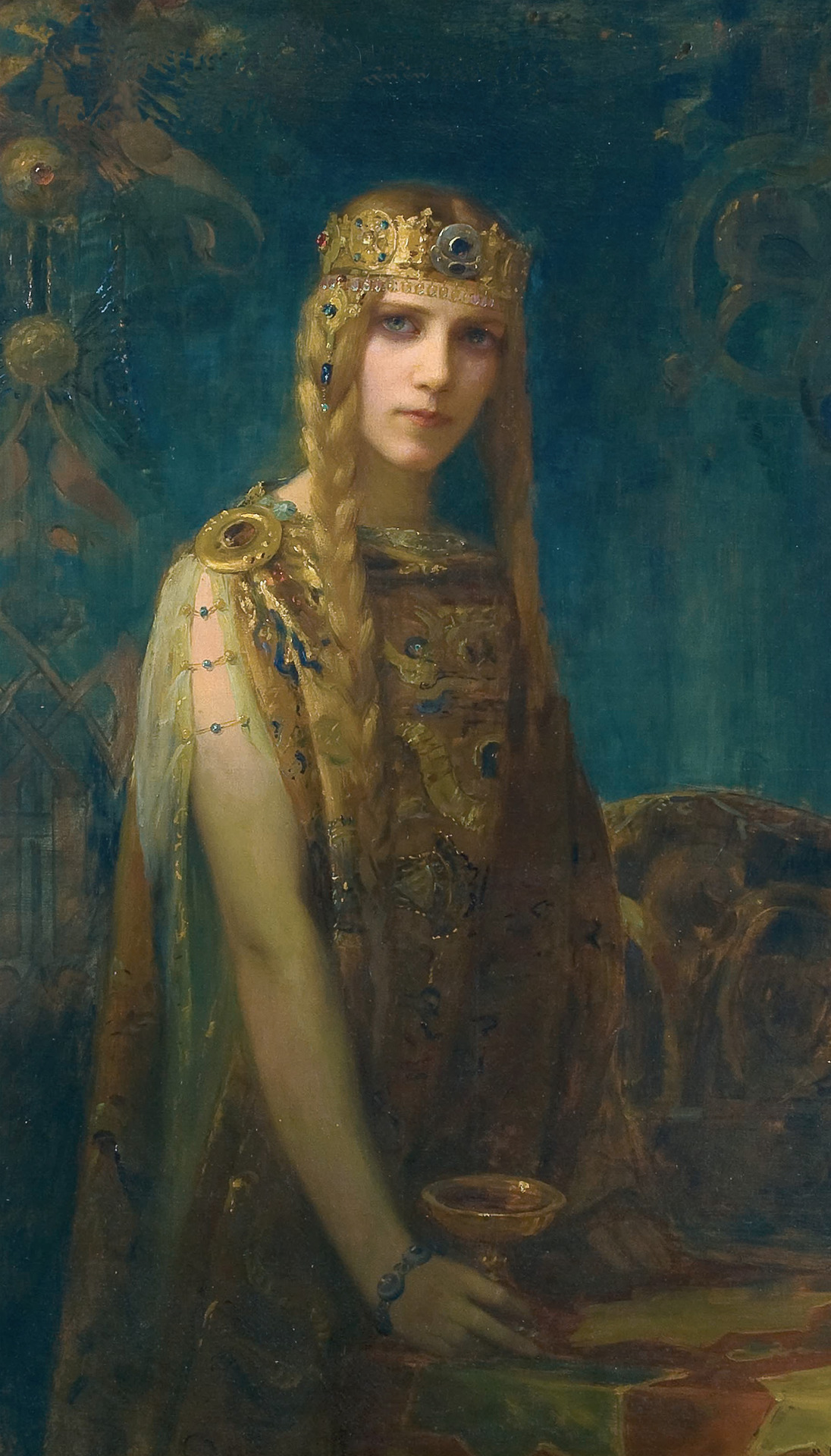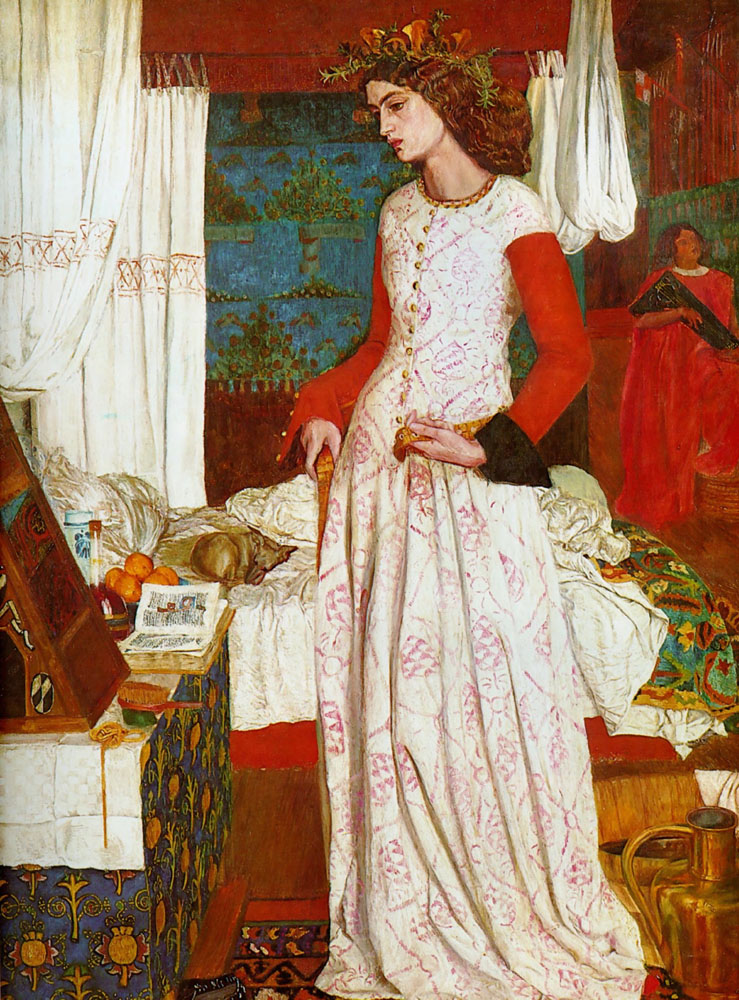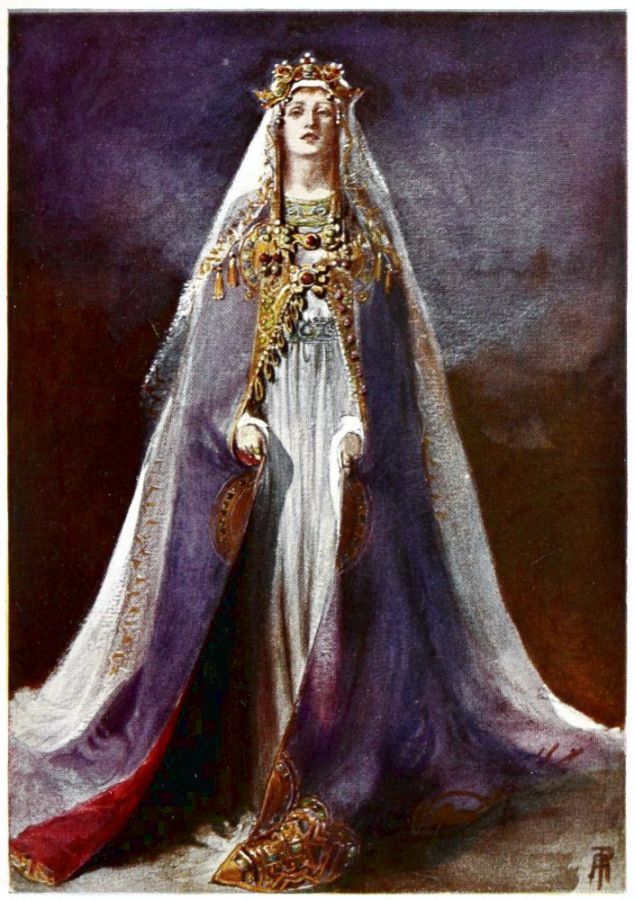Iseult on:
[Wikipedia]
[Google]
[Amazon]
 Iseult (), alternatively Isolde () and other spellings, is the name of several characters in the legend of Tristan and Iseult. The most prominent is Iseult of
Iseult (), alternatively Isolde () and other spellings, is the name of several characters in the legend of Tristan and Iseult. The most prominent is Iseult of
 The Irish princess, Iseult of Ireland is the daughter of King
The Irish princess, Iseult of Ireland is the daughter of King
 After King Mark learns of the secret love affair between Tristan and Iseult, he banishes Tristan to Brittany, never to return to Cornwall. There, Tristan is placed in the care of Hoel of Brittany after receiving a wound. He meets and marries Hoel's daughter, Iseult ''Blanchmains'' (Iseult "of the White Hands"), because she shares the name of his former lover. They never consummate the marriage because of Tristan's love for Iseult of Ireland.
During one adventure in Brittany, Tristan suffers a poisoned wound that only Iseult of Ireland, the world's most skilled physician, can cure. He sends a ship for her, asking that its crew fly white sails on the return if Iseult is aboard, and black if she is not. Iseult agrees to go, and the ship races home, white sails high. However, Tristan is too weak to look out his window to see the signal, so he asks his wife to check for him. In a moment of jealousy, Iseult of the White Hands tells him the sails are black, and Tristan expires immediately of despair. When the Irish Iseult arrives to find her lover dead, grief overcomes her, and she passes away at his side.
This death sequence does not appear in the Prose ''Tristan''. In fact, while Iseult of the White Hands figures into some of the new episodes, she is never mentioned again after Tristan returns to Cornwall, although her brother Kahedin remains a prominent character. The plot element of the fatal misunderstanding of the white and black sails is similar to—and might have been derived from— the story of Aegeus and Theseus in Greek mythology.
After King Mark learns of the secret love affair between Tristan and Iseult, he banishes Tristan to Brittany, never to return to Cornwall. There, Tristan is placed in the care of Hoel of Brittany after receiving a wound. He meets and marries Hoel's daughter, Iseult ''Blanchmains'' (Iseult "of the White Hands"), because she shares the name of his former lover. They never consummate the marriage because of Tristan's love for Iseult of Ireland.
During one adventure in Brittany, Tristan suffers a poisoned wound that only Iseult of Ireland, the world's most skilled physician, can cure. He sends a ship for her, asking that its crew fly white sails on the return if Iseult is aboard, and black if she is not. Iseult agrees to go, and the ship races home, white sails high. However, Tristan is too weak to look out his window to see the signal, so he asks his wife to check for him. In a moment of jealousy, Iseult of the White Hands tells him the sails are black, and Tristan expires immediately of despair. When the Irish Iseult arrives to find her lover dead, grief overcomes her, and she passes away at his side.
This death sequence does not appear in the Prose ''Tristan''. In fact, while Iseult of the White Hands figures into some of the new episodes, she is never mentioned again after Tristan returns to Cornwall, although her brother Kahedin remains a prominent character. The plot element of the fatal misunderstanding of the white and black sails is similar to—and might have been derived from— the story of Aegeus and Theseus in Greek mythology.
 Iseult (), alternatively Isolde () and other spellings, is the name of several characters in the legend of Tristan and Iseult. The most prominent is Iseult of
Iseult (), alternatively Isolde () and other spellings, is the name of several characters in the legend of Tristan and Iseult. The most prominent is Iseult of Ireland
Ireland ( ; ga, Éire ; Ulster-Scots: ) is an island in the North Atlantic Ocean, in north-western Europe. It is separated from Great Britain to its east by the North Channel, the Irish Sea, and St George's Channel. Ireland is the s ...
, the wife of Mark of Cornwall and the lover of Tristan
Tristan ( Latin/Brythonic: ''Drustanus''; cy, Trystan), also known as Tristram or Tristain and similar names, is the hero of the legend of Tristan and Iseult. In the legend, he is tasked with escorting the Irish princess Iseult to wed ...
. Her mother, the queen of Ireland, is also named Iseult. The third is Iseult of the White Hands, the daughter of Hoel of Brittany
Brittany (; french: link=no, Bretagne ; br, Breizh, or ; Gallo: ''Bertaèyn'' ) is a peninsula, historical country and cultural area in the west of modern France, covering the western part of what was known as Armorica during the period ...
and the sister of Kahedin.
Name
Her name is variably given as Iseult, Isolde, Yseult, Ysolt, Isode, Isoude, Iseut, Isaut (Old French), Iosóid (Irish), Esyllt (Welsh), Ysella (Cornish), Isolda (Portuguese, Spanish), Izolda (Serbian) and Isotta (Italian), among others. The oldest source, Béroul's 12th-century romance, spells her name as ''Yseut'' or ''Iseut''. The etymology is uncertain, with most sources linking it to theOld High German
Old High German (OHG; german: Althochdeutsch (Ahd.)) is the earliest stage of the German language, conventionally covering the period from around 750 to 1050.
There is no standardised or supra-regional form of German at this period, and Old Hig ...
words ''īs'' (" ice") and ''hiltja'' ("battle
A battle is an occurrence of combat in warfare between opposing military units of any number or size. A war usually consists of multiple battles. In general, a battle is a military engagement that is well defined in duration, area, and for ...
"). Other writers derive it from a Brythonic
Brittonic or Brythonic may refer to:
*Common Brittonic, or Brythonic, the Celtic language anciently spoken in Great Britain
*Brittonic languages, a branch of the Celtic languages descended from Common Brittonic
*Britons (Celtic people)
The Br ...
*''Adsiltia'', "she who is gazed upon."
Iseult of Ireland
 The Irish princess, Iseult of Ireland is the daughter of King
The Irish princess, Iseult of Ireland is the daughter of King Anguish of Ireland
King Anguish of Ireland ( cy, Ing o Iwerddon) is a mythological character in the stories of King Arthur. He is the father of Iseult, and one of Arthur's early enemies in the chronicles. After Arthur defeats him he acknowledges Arthur's supremacy, b ...
and Queen Iseult the Elder. She is a main character in the ''Tristan'' poems of Béroul, Thomas of Britain, and Gottfried von Strassburg and in the opera '' Tristan und Isolde'' by Richard Wagner
Wilhelm Richard Wagner ( ; ; 22 May 181313 February 1883) was a German composer, theatre director, polemicist, and conductor who is chiefly known for his operas (or, as some of his mature works were later known, "music dramas"). Unlike most op ...
.
Iseult is first seen as a young princess who heals Tristan
Tristan ( Latin/Brythonic: ''Drustanus''; cy, Trystan), also known as Tristram or Tristain and similar names, is the hero of the legend of Tristan and Iseult. In the legend, he is tasked with escorting the Irish princess Iseult to wed ...
from wounds he received fighting her uncle, Morholt. When his identity is revealed, Tristan flees back to his own land. Later, Tristan returns to Ireland to gain Iseult's hand in marriage for his uncle, King Mark
Mark of Cornwall ( la, Marcus, kw, Margh, cy, March, br, Marc'h) was a sixth-century King of Kernow (Cornwall), possibly identical with King Conomor. He is best known for his appearance in Arthurian legend as the uncle of Tristan and the husb ...
of Cornwall
Cornwall (; kw, Kernow ) is a Historic counties of England, historic county and Ceremonial counties of England, ceremonial county in South West England. It is recognised as one of the Celtic nations, and is the homeland of the Cornish people ...
. She is betrothed to an evil steward who claims to have killed a dragon and displays its head, but when Tristan proves he killed the dragon by showing that he already took its tongue, Iseult's parents agree to let him take her to Mark. On the journey back to Cornwall, Iseult and Tristan accidentally drink a love potion prepared for her and Mark by Iseult and guarded by Brangaine, Iseult's lady-in-waiting
A lady-in-waiting or court lady is a female personal assistant at a court, attending on a royal woman or a high-ranking noblewoman. Historically, in Europe, a lady-in-waiting was often a noblewoman but of lower rank than the woman to whom sh ...
. The two fall hopelessly in love, and begin an affair that ends when Mark banishes Tristan from Cornwall.
In the verse tradition, the lovers do not meet again until Tristan is on his death bed (see below), but in the later Prose ''Tristan'' and works based upon it, Tristan returns from Brittany
Brittany (; french: link=no, Bretagne ; br, Breizh, or ; Gallo: ''Bertaèyn'' ) is a peninsula, historical country and cultural area in the west of modern France, covering the western part of what was known as Armorica during the period ...
and they resume their affair. Mark is much less sympathetic in these versions, and the lovers eventually flee from his wrath. Lancelot
Lancelot du Lac (French for Lancelot of the Lake), also written as Launcelot and other variants (such as early German ''Lanzelet'', early French ''Lanselos'', early Welsh ''Lanslod Lak'', Italian ''Lancillotto'', Spanish ''Lanzarote del Lago' ...
gives them refuge in his estate Joyous Gard
Joyous Gard (French ''Joyeuse Garde'' and other variants) is a castle featured in the Matter of Britain literature of the legend of King Arthur. It was introduced in the 13th-century French Prose ''Lancelot'' as the home and formidable fortress ...
e, and they engage in many further adventures.
In the prose versions, the lovers' end comes when Mark finds them as Tristan plays the harp for Iseult beneath a tree. The cruel king stabs his nephew in the back, and Tristan, at Iseult's request, fatally crushes his beloved in a tight embrace as his final act. One of her rumored burial sites is Chapelizod in Dublin, Ireland.
Iseult of Brittany
 After King Mark learns of the secret love affair between Tristan and Iseult, he banishes Tristan to Brittany, never to return to Cornwall. There, Tristan is placed in the care of Hoel of Brittany after receiving a wound. He meets and marries Hoel's daughter, Iseult ''Blanchmains'' (Iseult "of the White Hands"), because she shares the name of his former lover. They never consummate the marriage because of Tristan's love for Iseult of Ireland.
During one adventure in Brittany, Tristan suffers a poisoned wound that only Iseult of Ireland, the world's most skilled physician, can cure. He sends a ship for her, asking that its crew fly white sails on the return if Iseult is aboard, and black if she is not. Iseult agrees to go, and the ship races home, white sails high. However, Tristan is too weak to look out his window to see the signal, so he asks his wife to check for him. In a moment of jealousy, Iseult of the White Hands tells him the sails are black, and Tristan expires immediately of despair. When the Irish Iseult arrives to find her lover dead, grief overcomes her, and she passes away at his side.
This death sequence does not appear in the Prose ''Tristan''. In fact, while Iseult of the White Hands figures into some of the new episodes, she is never mentioned again after Tristan returns to Cornwall, although her brother Kahedin remains a prominent character. The plot element of the fatal misunderstanding of the white and black sails is similar to—and might have been derived from— the story of Aegeus and Theseus in Greek mythology.
After King Mark learns of the secret love affair between Tristan and Iseult, he banishes Tristan to Brittany, never to return to Cornwall. There, Tristan is placed in the care of Hoel of Brittany after receiving a wound. He meets and marries Hoel's daughter, Iseult ''Blanchmains'' (Iseult "of the White Hands"), because she shares the name of his former lover. They never consummate the marriage because of Tristan's love for Iseult of Ireland.
During one adventure in Brittany, Tristan suffers a poisoned wound that only Iseult of Ireland, the world's most skilled physician, can cure. He sends a ship for her, asking that its crew fly white sails on the return if Iseult is aboard, and black if she is not. Iseult agrees to go, and the ship races home, white sails high. However, Tristan is too weak to look out his window to see the signal, so he asks his wife to check for him. In a moment of jealousy, Iseult of the White Hands tells him the sails are black, and Tristan expires immediately of despair. When the Irish Iseult arrives to find her lover dead, grief overcomes her, and she passes away at his side.
This death sequence does not appear in the Prose ''Tristan''. In fact, while Iseult of the White Hands figures into some of the new episodes, she is never mentioned again after Tristan returns to Cornwall, although her brother Kahedin remains a prominent character. The plot element of the fatal misunderstanding of the white and black sails is similar to—and might have been derived from— the story of Aegeus and Theseus in Greek mythology.
Modern portrayals
*German composerRichard Wagner
Wilhelm Richard Wagner ( ; ; 22 May 181313 February 1883) was a German composer, theatre director, polemicist, and conductor who is chiefly known for his operas (or, as some of his mature works were later known, "music dramas"). Unlike most op ...
composed the opera '' Tristan und Isolde'' based upon ''Tristan'', a tale of chivalrous romance from the Middle Ages by Gottfried von Strassburg.
* In Tennyson's '' ''The Last Tournament'''' Isolt is depicted much less favorably. "She is petulant and demanding, disdainful of Mark, and prideful towards Tristram, loving and hating irrationally and unevenly."
* Matthew Arnold, in his 1852 poem ''Tristram and Iseult
''Tristram and Iseult'', published in 1852 by Matthew Arnold, is a narrative poem containing strong romantic and tragic themes. This poem draws upon the Tristan and Iseult legends which were popular with contemporary readers.
Background
Arnol ...
'', focuses on Iseult of Brittany in the context of the Victorian cult of domesticity.
*Iseult of Ireland (as Isolde) was played by Sophia Myles
Sophia Jane Myles (; born 18 March 1980) is an English actress. She is best known in film for portraying Lady Penelope Creighton-Ward in ''Thunderbirds'' (2004), Isolde in '' Tristan & Isolde'' (2006), Darcy in '' Transformers: Age of Extinctio ...
in the 2006 film adaptation, '' Tristan & Isolde''.
*Isolde is confused with Minerva
Minerva (; ett, Menrva) is the Roman goddess of wisdom, justice, law, victory, and the sponsor of arts, trade, and strategy. Minerva is not a patron of violence such as Mars, but of strategic war. From the second century BC onward, the R ...
in the 1960 film by Jean Cocteau
Jean Maurice Eugène Clément Cocteau (, , ; 5 July 1889 – 11 October 1963) was a French poet, playwright, novelist, designer, filmmaker, visual artist and critic. He was one of the foremost creatives of the s ...
, '' The Testament of Orpheus''.
*Author, scholar and historian Rosalind Miles wrote a trilogy of fictional novels based upon the romance of Iseult, beginning with ''Isolde: Queen of the Western Isle'' (2002), followed by ''The Maid of the White Hands'' (2005), and concluding with ''The Lady of the Sea'' (2005).
*Iseult was played by Irish actress Charlie Murphy Charles or Charlie Murphy may refer to: Charlie Murphy
Politics
*Charles Murphy (1880–1958), Irish politician more commonly referred to as Cathal Ó Murchadha
* Charles Murphy (Australian politician) (1909–1997), member of the Victorian Legis ...
in '' The Last Kingdom'', a British historical fiction television series
A television show – or simply TV show – is any content produced for viewing on a television set which can be broadcast via over-the-air, satellite, or cable, excluding breaking news, advertisements, or trailers that are typically placed be ...
based on Bernard Cornwell's ''The Saxon Stories
''The Saxon Stories'' (also known as ''Saxon Tales''/''Saxon Chronicles'' in the US and ''The Warrior Chronicles'' and most recently as ''The Last Kingdom'' series) is a historical novel series written by Bernard Cornwell about the birth of En ...
'' series of novels where Iseult hails from Kernow or Cornwalum (modern Cornwall).
References
Sources
*Ronan Coghlan ''The Illustrated Encyclopedia of Arthurian Legends'', New York, 1993. *Norris J. Lacy (editor) ''The New Arthurian Encyclopedia'', New York: Garland, 1996.See also
* Tristan and Iseult * 211 Isolda {{Arthurian Legend Arthurian characters Breton mythology and folklore Mythological queens Mythological princesses *Iseult Welsh mythology